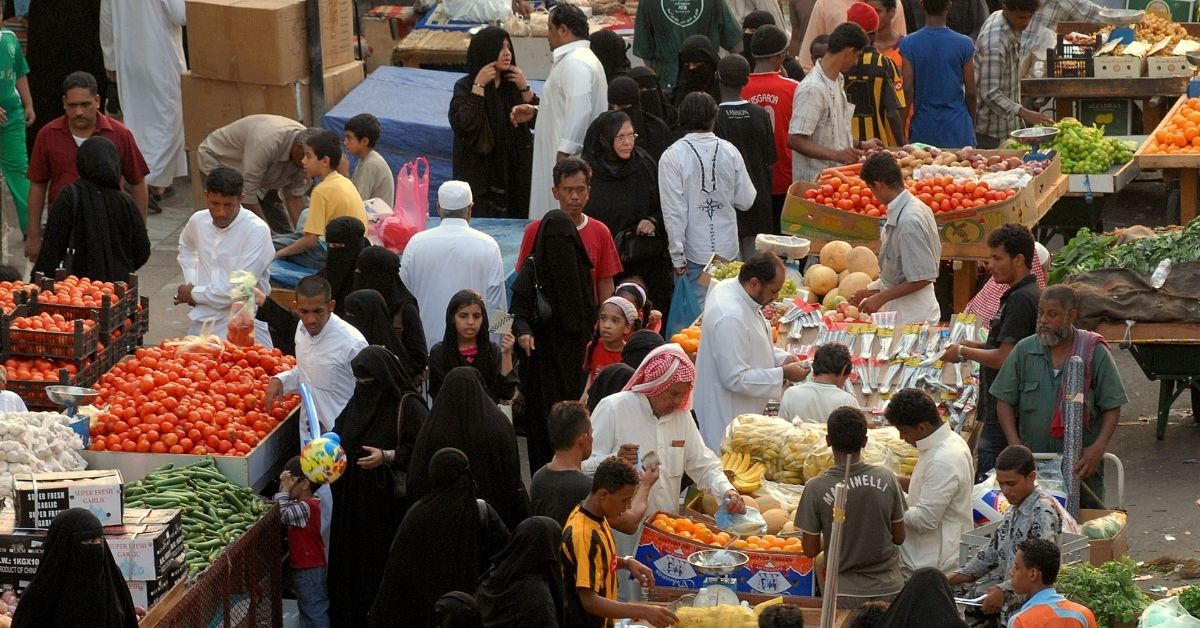ABU DHABI, UAE — In a world grappling with economic uncertainties, the Gulf Cooperation Council (GCC) countries have managed to maintain an inflation rate significantly lower than their Middle Eastern counterparts and the global average. This stability comes as global inflation sees a gradual decline in 2023, a stark contrast to the previous year.
Overall, global inflation has been gradually slowing down in 2023 as compared to 2022 mainly due to lower food prices, falling energy prices and softening global demand due to monetary tightening policies.
Key geopolitical factors such as the recommencement of grain exports from Ukrainian ports under the recently collapsed Black Sea Grain Initiative contributed to the decline in global food prices.
However, despite the falling trend of inflation during the first seven months of the year, global headline inflation appears to have peaked while global core inflation remains well above central bank targets.
According to the IMF’s World Economic Outlook Update, global headline inflation is forecasted to decline from 8.7 percent in 2022 to 6.8 percent in 2023 and 5.2 percent in 2024.
On the other hand, global core inflation is expected to decline from an annual average of 6.5 percent in 2022 to 6 percent in 2023 and 4.7 percent in 2024 underling a slower pace of decrease than headline inflation. The persistence of global core inflation is mainly attributed to advanced countries where core inflation remains high despite witnessing significant fall in headline inflation.
The World Economy at a Glance Global Inflation Trends * Global inflation gradually slowing down in 2023 compared to 2022. * Global headline inflation forecasted to decline from 8.7% in 2022 to 6.8% in 2023 and 5.2% in 2024. * Global core inflation expected to decline from 6.5% in 2022 to 6% in 2023 and 4.7% in 2024. GCC Inflation Subcategories * Food and Beverages CPI subcategory for Kuwait: 6.3% growth in June-2023. * Saudi Arabia's Food and Beverages subcategory growth: 1.0% in June-2023. * Housing inflation in Saudi Arabia: 9.1% y-o-y growth in June-2023. * Housing inflation in Kuwait: 3.2% y-o-y growth in June-2023. * Dubai's Housing prices rate: 6.1% growth in June-2023. * Saudi Arabia and Qatar's Communications inflation rate: -0.7% and -4.0% y-o-y in June-2023, respectively. * Saudi Arabia's Education costs: 0.4% growth in June-2023 (down from 19% in June-2022). * Kuwait's Education CPI subcategory: 3% in June-2023 (down from 6.2% in June-2022). Rate Hikes and Inflation * US Federal Reserve increased its benchmark overnight interest rate by 0.25% to a range of 5.25% to 5.5% in July-2023. * Central Bank of the UAE increased its base rate on overnight deposits by 0.25% to 5.40%. * Saudi Arabia's Central Bank (SAMA) increased its repo and reverse repo rates by 25 bps to 6.0%. * Bahrain's Central Bank increased its interest rate on overnight deposits by 0.25% to 6%. * Central Bank of Kuwait increased its borrowing rate by 25 bps to 4.25%. * Central Bank of Oman increased its repo rate by 0.25% to 6%. * Central Bank of Qatar raised its repo rate by 25 bps to 6%. Country-specific Inflation * Saudi Arabia - Annual CPI for July-2023: 2.3% (compared to 2.7% in July-2022). - Actual rents for housing increased by 10.3% in July-2023. - Food and beverages group growth rate: 1.4% in July-2023. - Monthly CPI growth: 0.1% in July-2023. * The UAE - Dubai CPI growth in July-2023: 1.0% (compared to 5.2% in July-2022). - Transportation group costs fell by 19.7% in July-2023. - Housing, water, electricity, and gas group growth: 6.1% y-o-y in July-2023. - Monthly inflation growth: 0.4% in July-2023. * Qatar - Inflation rate in June-2023: 2.5% y-o-y. - General Consumer Price Index: 105.71 points in June-2023. - Housing group price increase: 5.9% y-o-y in June-2023. - Monthly inflation rate peak: 4.4% in February-2023. - Average CPI rate expected for 2023: 3% according to the IMF.
In terms of sub-categorical inflation changes, the Food and Beverages subcategory has been one of the most important categories in terms of weight or gradual decline in GCC inflation performance, says a new report by Kamco Invest.
The Food and Beverages subcategory has been stable or witnessed a moderate growth in nearly all the GCC countries.
For example, the Food and Beverages CPI subcategory for Kuwait recorded a y-o-y moderate monthly growth of 6.3 percent in June-2023 followed by Saudi Arabia with Food and Beverages subcategory growth of 1 percent during the month.
Among the GCC countries, inflation growth in the Housing subcategory was on an upward trend led by 9.1 percent y-o-y growth in Saudi Arabia followed by 3.2 percent y-o-y uptick in Kuwait during June2023.
Similarly, Dubai’s Housing prices rate expanded 6.1 percent during the similar period. In terms of the Communication subcategory, the picture was the opposite as the sub-index decreased for most of the countries in the GCC.
Both Saudi Arabia and Qatar recorded decline in Communications inflation rate at -0.7 percent and -4 percent y-o-y during June-2023, respectively.
In the Education subcategory, GCC inflation has also been on the declining trajectory. Saudi Arabia’s Education costs fell from a growth of 19 percent in June-2022 to a growth of 0.4 percent during June-2023 supporting the Kingdom’s overall CPI decline during the period.
Moreover, Kuwait’s Education CPI subcategory has also dropped from 6.2 percent in June-2022 to just 3 percent in June-2023
GCC rate hikes and inflation
The US Federal Reserve was back with rate hikes in July-2023 after a momentary pause in June-2023 to reign against inflation. In its most recent rate hike, the US Federal Reserve increased its benchmark overnight interest rate by 0.25 percent to a new range of 5.25 percent and 5.5 percent, underlining the Fed’s highest level of borrowing rate in 22 years.
In response to the Fed’s rate hike, GCC central banks have also increased their benchmark borrowing rates.
The Central Bank of the UAE has increased its base rate on overnight deposits by 0.25 percent (25 bps) to 5.40 percent. The Emirates also maintained its short-term liquidity borrowing rate at half a percentage point above the base rate.
Similarly, Saudi Arabia’s Central Bank (SAMA) has also matched the US Federal Reserve’s recent rate increase by increasing its repo and reverse repo rates by 25 bps to 6 percent recording 100 bps rate increase. Bahrain’s Central Bank increased its interest rate on overnight deposits by 0.25 percent to 6 percent but maintained its four-week deposit rate at 6.75 percent and lending rate at 7 percent.
Similarly, the central banks of Kuwait, Qatar and Oman all raised their respective key borrowing rates by quarter of percentage point each to match the US Federal Reserves rate rises during July-2023.
The Central Bank of Kuwait increased its borrowing rate by 25 bps to 4.25 percent, the Central Bank of Oman increased its repo rate by quarter of a percentage point to 6 percent and the Central Bank of Qatar raised its repo rate by 25 bps to 6 percent.

Saudi Arabia
The annual Consumer Price Index in the Kingdom of Saudi Arabia for July-2023 increased by 2.3 percent as compared to 2.7 percent in July-2022. The CPI uptick was mainly driven by higher prices in the housing, water, electricity, and other fuels groups as well as increased prices in the food and beverages groups.
According to Saudi Arabia’s General Authority for Statistics, actual rents for housing increased by 10.3 percent during July-2023 demonstrating the 21.1 percent growth in rents for apartments and underlining the importance of the housing group to the overall CPI index performance. Moreover, the food and beverages group, the second highest weight of the CPI index (18.8 percent of the total index weight), recorded a 1.4 percent growth rate during July-2023.
In terms of m-o-m change, the Kingdom’s CPI witnessed a marginal growth of 0.1 percent during July-2023 as compared to June2023. The Kingdom’s monthly CPI growth was mainly contributed by marginal increases in housing, water, gas, and electricity prices by 0.3 percent which resulted in price increase in actual rents for housing which witnessed 0.3 percent m-o-m growth.
The UAE
The Dubai Consumer Price index grew by 1 percent during July-2023 as compared to the 5.2 percent increase it witnessed during July2022. This was the smallest growth witnessed by the Dubai CPI in the last 17 consecutive months.
The drastic decline of Dubai’s CPI was mainly due to the drop in transportation group costs which witnessed 19.7 percent fall during July-2023. The fall in transport costs more than compensated for the 6.1 percent y-o-y growth of the housing, water, electricity and gas group during the month.
Overall, only 3 out of Dubai’s 13 CPI subgroups recorded y-o-y decreases during the month. On the other hand, certain key subgroups saw year on year growth during July-2023; namely food and beverage group (3.2 percent), hotels & restaurants group (3.5 percent) and education group (1.6 percent).
In terms of month-on-month inflation growth, Dubai’s CPI index remained stable during July-2023 only registering 0.4 percent. Dubai’s Housing, Water, Electricity, Gas and other Fuels subgroup, the largest weighted group Dubai’s CPI, recorded 0.49 percent m-o-m during the month, while the Sport, Culture and Recreation subgroup witnessed 4.55 percent, i.e., the largest m-o-m gain among the groups in Dubai’s CPI.
Qatar
Qatar’s inflation rate increased by 2.5 percent y-o-y during June-2023, recording its lowest increase since July-2021.
Qatar’s inflation rate growth albeit moderate was driven by overall prices increase across ten out of the eleven categories or sub-indices of its CPI. The country’s General Consumer Price Index reached 105.71 points in June-2023 witnessing a 0.1 percent m-o-m dip over May -2023.
Inflation during the month was mainly driven by moderate rise in prices in the Housing group that saw an increase of 5.9 percent y-o-y in June-2023 followed by Recreation & Culture and Education groups with y-o-y increases of 5.8 percent and 4.1 percent, respectively.
Comparatively, Qatar’s Food and Beverages sub-index which has recorded y-o-y decline during three out of the first five months of the year, has been stable and registered no growth (0 percent) during June-2023. In terms of outlook, Qatar’s CPI rate which averaged 5 percent during the past year is expected to decline and average 3 percent during 2023 according to the IMF.
Qatar’s monthly inflation rate reached its highest peak at 4.4 percent in February-2023. In context, Qatar’s monthly inflation rate has been on a downward trend since December-2022, recording only one m-o-m uptick during February-2023.

